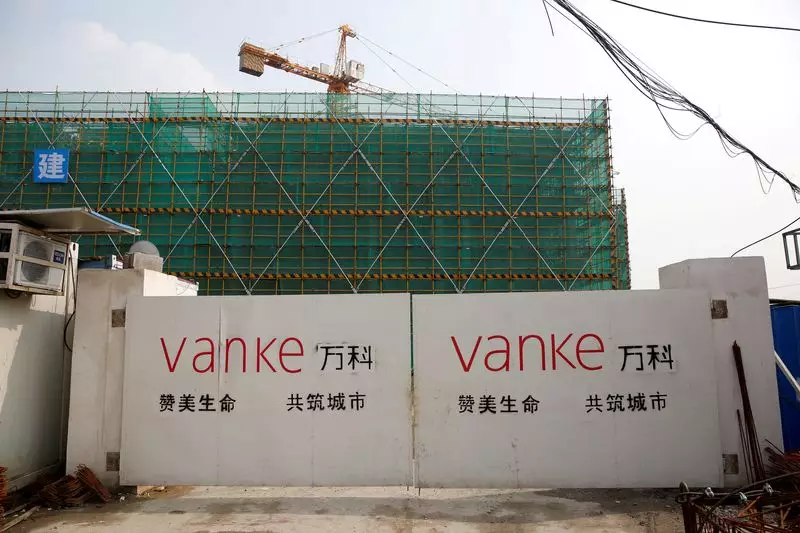The intricate dynamics of China’s real estate sector have come under intense scrutiny as the liquidity crisis continues to loom large, particularly surrounding one of the industry’s key players—China Vanke. The gradual unraveling of this real estate titan, once thought to be insulated from market turmoil, is now forcing the government’s hand as it grapples with potential intervention. This article delves into Vanke’s financial troubles, the implications for the wider real estate landscape, and the anticipated response from authorities.
For nearly five years, China’s property market has wrestled with a debilitating liquidity crisis resulting from a concoction of systemic failures and strict regulatory measures imposed by the government. The collapse of other major developers like China Evergrande has rattled investor confidence, creating a ripple effect that leaves even the most stable companies vulnerable. Amidst this environment, Vanke—recognized for its substantial portfolio and backing by state-owned enterprises—now faces grave questions regarding its financial stability and future.
Recent reports revealing the possible detention of Vanke’s CEO and speculations regarding a potential takeover only amplify these concerns, leading to swift reactions from credit rating agencies that have downgraded the company to junk status. Market observers are acutely aware of Vanke’s hefty debt burden, reported to be approximately 331.3 billion yuan, which raises alarm bells about its ability to meet upcoming repayments. The urgency of these financial obligations has ignited discussions about the role of the government in stabilizing this emblematic entity.
Historically, Beijing has refrained from direct bailouts in an effort to avoid forming a precedent of moral hazard in the market. However, the current predicament poses significant risks that could undermine years of stabilization efforts. With Vanke’s potential financial collapse posing a danger not only to its operations but also to the entire property sector, the government may need to reconsider its stance. Analysts suggest that an intervention is expected, if not already in motion, reflecting how crucial Vanke’s health is to restoring confidence among homebuyers and financial institutions alike.
The Shenzhen government, where Vanke is headquartered, has reportedly been fostering discussions with local state-owned enterprises regarding strategies to mitigate Vanke’s debt risks, including asset disposals. Such efforts indicate a willingness to step in, albeit carefully, to ensure any intervention does not accumulate more debt but simply restructures existing financial commitments.
The prospect of Vanke defaulting on its debts raises critical alarms for the entire real estate landscape in China. Should Vanke falter, it could trigger a widespread hesitance among banks to extend credit to other players in the sector already teetering under the weight of accumulated debts. A significant downturn in Vanke’s operations may serve as the catalyst for renewed pessimism among homebuyers and investors alike, ultimately prolonging the crisis that the market has been trying to navigate.
The fears that Vanke’s plight is the tipping point have prompted calls for a clearly defined, structured bailout plan. Such a plan should not only aim to inject liquidity but also focus on stabilizing the market through methods that reinforce the completion of pre-sold homes. The emphasis on fulfilling these obligations aligns with Beijing’s renewed commitment to restoring homebuyer confidence, a vital component for any recovery in the sector.
As the situation continues to evolve, market stakeholders are observing the government’s next moves with keen interest. Although no concrete plan has been unveiled, the narrative around a potential full takeover has gained traction among analysts as a viable best-case scenario. In this context, the government would not only stabilize Vanke but could also set a precedent that showcases a firm commitment to safeguarding the property sector.
The future remains uncertain, with analysts divided on whether Vanke can sidestep default without immediate and decisive state support. Government interventions either through financial backing, restructuring, or asset acquisition may be commodified to stave off a worst-case scenario, ensuring that the implications of Vanke’s operations do not further compromise the already fragile status of China’s property market.
Vanke stands at a pivotal juncture, representing not just the challenges facing itself, but the broader implications for China’s real estate sector. The outcome of the forthcoming interventions—and whether they can manifest as comprehensive solutions—will be instrumental in shaping the trajectory of an industry deeply entwined with the Chinese economy.

